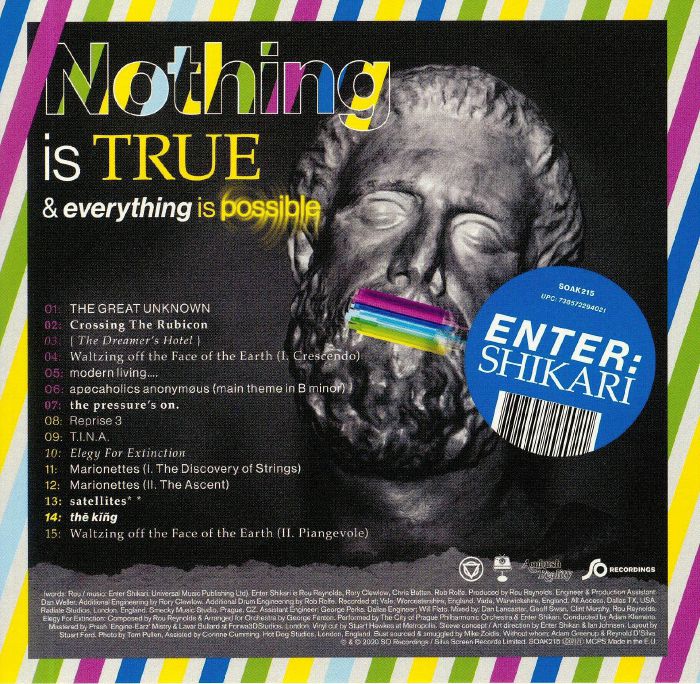
In 1999 a band named Hybryd formed, consisting of Rou Reynolds on guitar and vocals, Chris Batten on bass guitar, and Rob Rolfe on drums.

2 Musical style, lyrical themes and influences.1.8 Nothing Is True & Everything Is Possible (2020–present).Their eclectic musical style combines influences from rock music genres with those from various electronic music genres.

However, they have also signed distribution deals with several major labels to help with worldwide distribution. Their sixth album Nothing Is True & Everything Is Possible was released in April 2020.Įnter Shikari have their own record label, Ambush Reality. Their fifth studio album The Spark was released in 2017. The band spent a considerable amount of time supporting the latter release through the A Flash Flood of Colour World Tour, before beginning work on a fourth studio album, The Mindsweep, which was released in 2015. Both have since been certified silver in the UK. Their second, Common Dreads, was released in 2009 and debuted on the UK Albums Chart at number 16 while their third, A Flash Flood of Colour, was released in 2012 and debuted on the chart at number 4. Their debut studio album, Take to the Skies, was released in 2007 and reached number 4 in the Official UK Album Chart, and has since been certified gold in the UK.
#ENTER SHIKARI BANDCAMP DOWNLOAD#
In 2006, they performed to a growing fanbase at Download Festival as well as a sold-out concert at the London Astoria. In 2003, guitarist Rory Clewlow joined the band to complete its current lineup, and it adopted its current name. For MTV Unplugged, we were mourning.Enter Shikari (sometimes stylised as enter: shikari and most commonly as ΣΠΤΣR SΗΦΚ∆RΦ) are a British rock band formed in St Albans, Hertfordshire, England in 1999 by bassist Chris Batten, lead vocalist and keyboardist Rou Reynolds, and drummer Rob Rolfe. One of just three Unplugged performances in 2015 came from Placebo, who had peaked in 1998 with a song that rhymed “weed” with “need” and “dawning” with “morning”. With Unplugged’s credibility now in tatters, anyone could appear on it. Is he being ironic? Trying to conceal his embarrassment? Why is he involved in this debacle? Has he been taken hostage? In 200 years’ time, when the mystifying Mona Lisa has perished beyond restoration and the public can no longer countenance tediously two-dimensional portraits, La Gioconda’s place in the Louvre will be taken up by a holographic ad infinitum loop of Smith repeating the words “I … I’m actually a big fan of Korn … they’re a phenomenal live band”. More fascinating is the interview snippet where Smith extols Korn’s virtues. At one point, Robert Smith mooches onstage resembling The Last Days of Elizabeth Taylor for a medley in which the Cure’s In Between Days segues into nu-metal turkey Make Me Bad. With Jonathan Davis’s whiny, whispered singing and his band’s lack of refinement starkly exposed, Korn: MTV Unplugged almost transgresses the boundaries of unintentional hilarity to become a masterpiece of a misstep. Instead, they chose Incubus, Staind and, ropiest of all, Korn. Unplugged even neglected to book the superior nu-metal bands such as Deftones and Kittie.

Nu-metal was a genre less suited to acoustic reinterpretation than Michael Bay is to direct Phantom Thread II. Taking the riffs and roars of metal, adding the scratches and raps of hip-hop, and upping the misogyny quota of both, a scene was born wherein shorts were acceptable stagewear.

Poorer still were the next generation of angst-ridden white boys. Then horn-voiced Katy Perry arrived after one album to perform lounge-jazz versions of her clumsily problematic songs I Kissed A Girl and Ur So Gay. Unplugged had once semaphored an act rising to significance. Unfortunately, MTV’s curatorial nous went awry. The show allowed older statesmen such as Neil Young to reach a younger audience, too, but let’s not be rockist because it wasn’t only white guitar dudes who shone: Mariah Carey stormed it thanks to her invincible vocal range Jay-Z’s appearance marked the latest chapter in hip-hop’s infiltration of the mainstream. Alice in Chains had their own Woody Guthrie moment via a bass guitar emblazoned with a slogan denouncing Metallica’s short hair. Pearl Jam made a feminist statement when their singer scrawled “pro-choice” on his arm in magic marker. It was where Nirvana offered up obscure cover versions and the adorable sight of Dave Grohl trying his damnedest to drum quietly. This includes the acoustic performance show MTV Unplugged, which, for a while, showcased stripped-back and often surprising performances from a range of worthy musicians. From Toys R Us to the state of Gary Lineker’s upper lip and chin, many things fared better in the 90s.


 0 kommentar(er)
0 kommentar(er)
